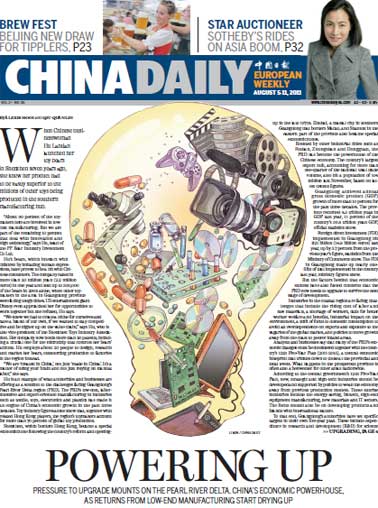G20 must face the music
Updated: 2011-08-05 11:04
By Zheng Xiwen (China Daily European Weekly)
Developed economies that issue international reserve currencies should shoulder their fiscal responsibilities
 |
However, the US debt issue is far from being resolved.
According to the compromise deal finally reached between the Republicans and the Democrats, the US government promised to cut its spending in exchange for a raising of the debt limit. The deficit-reduction plan is to be negotiated in November.
It is not difficult to see that neither party has specific concrete proposals to increase government revenues or practical ideas on how to get out of the debt problems.
The current agreement is only a temporary arrangement to buy time. When it comes time to get down to the nitty-gritty details, the issue will hit the headlines once again.
Things have changed a great deal in the world in the 21st century. The US dollar used to be equivalent to gold, US treasury bonds were regarded as "zero risk", and US assets regarded as a "safe haven". Now astonishingly, the US government might have less cash than the maker of the popular iPad and iPhone.
According to some reports, the amount of money that the US government has to play with before it hits the debt ceiling is around $73.8 billion (51.8 billion euros), about $2 billion less than Apple Inc's reserves of $76.2 billion in cash and securities.
In fact, the US government is not alone in struggling with a debt problem. Some eurozone countries and Japan are also suffering the same woes. Japanese debt is as high as 200 percent of its GDP and worries are increasing. Meanwhile, the sovereign debt crisis in the European Union has kept deteriorating.
The confidence in the second aid package for Greece is fading following another downgrading of the country's credit rating. And, over the past week, yields on Spanish and Italian debts have spiked. Spanish 10-year bonds are now yielding close to 6 percent and the yield on 10-year Italian debt has jumped from 4.8 percent to over 5.5 percent.
People are more than happy to shift from frugality to a life of luxury, but the reverse of course is not so appealing. Considering their long history of excessive consumption and deficit spending, it is not easy for Western countries to live within their means and escape the gravitational pull of their debt black holes.
Debt problems in the developed countries not only hurt themselves, but also harm the innocent developing countries, including China whose US and euro treasury holdings are at risk.
Besides, the protracted debt problems of developed countries will intensify the financial market's turmoil and cast a shadow over the world's economic recovery. It will also make external conditions for China's development more complicated and pose greater challenge to the Chinese government's macro-economic policies.
It is not excessive to say that the debt problems of the developed countries have become an outstanding threat to the healthy and sustainable development of the world economy.
The G20 plays an important role for countries to address the international financial crisis in a cooperative way, and is actively evolving into a regular global economic governance mechanism.
Faced with the global implications of the debt problems of developed countries, the G20 should not turn a blind eye and keep silent.
At the 6th annual G20 summit in Cannes, France, in November, it is time for the G20 to urge the US and other major powers that issue international reserve currencies to implement responsible currency and fiscal policies, to protect creditor's interests and make joint efforts to promote world economic recovery on a solid ground.
The author is an observer of international issues.
E-paper

My Chinese Valentine
Local businesses are cashing in on a traditional love story involving a cow herder and a goddess
Outdoor success
Lifting the veil
Allure of mystery
Specials

Sowing the seeds of doubt
The presence in China of multinationals such as Monsanto and Pioneer is sparking controversy

Lifting the veil
Beijing's Palace Museum, also known as the Forbidden City, is steeped in history, dreams and tears, which are perfectly reflected in design.

Beer we go
Early numbers not so robust for Beijing's first international beer festival
